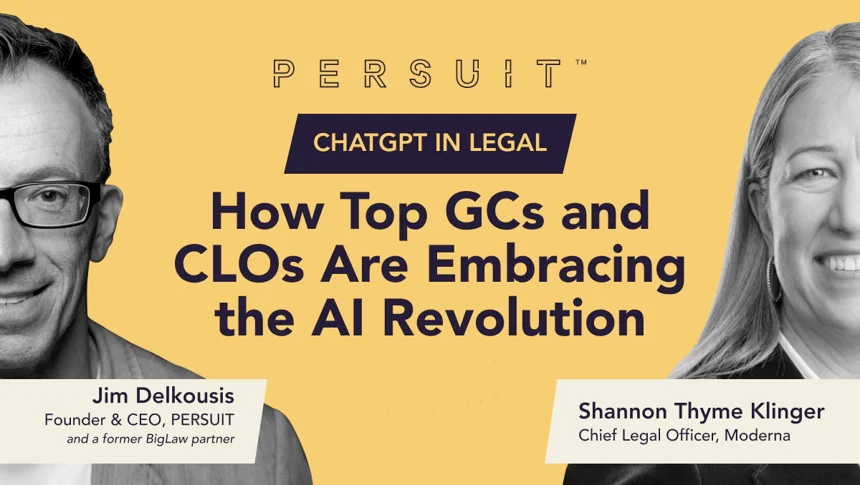
ChatGPT and large-language model AIs are redefining what’s possible in legal.
And also raising red flags.
“Is this a threat to our IP?”
“Does this trigger data privacy concerns?”
“How do we ensure we are protecting privileged and confidential information?”
Shannon Thyme Klinger, Chief Legal Officer of Moderna, has a different view, which she shared recently during a webinar with PERSUIT’s founder and CEO Jim Delkousis:
“I think with every risk, you also have to think about the opportunity.”
Shannon and Jim — himself a former BigLaw partner — had a wide-ranging discussion during the webinar, answering many of the questions on the minds of in-house legal leaders.
In this article, we’ve pulled some of the key takeaways and highlights.
Note: The webinar replay is available in PERSUIT’s resources area. You can watch the full video here.
What is ChatGPT and how will it (and similar AI tools) impact in-house legal teams?
ChatGPT is a computer algorithm that absorbs, processes, and outputs data. Over time, AI tools such as ChatGPT learn, using the result of past experiences to make better predictions and generate better outputs.
ChatGPT was introduced in November of 2022 by OpenAI. It is just one of several large language model (LLM) AI applications currently on the market, including Google’s Bard and a planned LLM AI integration with Microsoft's Office 365.
Here, Shannon quickly explains how ChatGPT works and how it will impact in-house legal teams:
Can ChatGPT be used by an in-house legal department? And what are the risks?
The short answer is: Yes! But there are risks to consider when doing so. Shannon broke down the risks into four categories:
- AI “hallucination,” when an AI tool gives factually incorrect information.
- Preventing intellectual property from entering the public domain.
- Changing regulations around the use of AI.
- The ethical use of AI tools.
Of these risks, the one that worries Shannon the most is intellectual property.
“It’s so easy to inadvertently get things out into the public domain that are critically important to enabling your business and to protecting it,” she said.
“That’s why we locked down the external version of ChatGPT and created the internal version to help stop people from making mistakes that could — in the long run — hurt the company.”
At Moderna, Shannon has worked with her chief information officer to implement a private instance of ChatGPT, one that works behind the company’s firewall and does not communicate with the outside world. This is the only version of ChatGPT authorized by Moderna for employees.
“It lags a little bit because we have to go back out and update it so it continues to learn as the large language model is learning more publicly,” Shannon said. “But it allows us to use ChatGPT differently internally.”
Can GCs and CLOs take a wait-and-see approach to ChatGPT and AI?
In Shannon’s view, ignoring ChatGPT and AI tools would be a mistake for GCs and CLOs.
“I don’t think, as chief legal officers, we can sit on the sidelines.”
“The more I started to play with it, the more I realized it’s not going to be too long before some of our favorite consulting firms are going to go to our boards or our CEOs and say: ‘We can give you 30, 40, or 50% costs savings in your legal spend, because we can completely restructure the way of working… And we’ll do it for 10% of the amount of savings.’”
“I don’t know many CEOs who wouldn’t jump at the opportunity to drive efficiencies in a space, frankly, that a lot of people don’t understand,” she added. Here's Shannon's full explanation:
What’s a specific example of how ChatGPT can be used in legal?
Moderna’s in-house team has been able to use ChatGPT in many creative ways so far.
For example, Shannon’s team needed a new conflict of interest policy and was going to outsource that work to one of their firms. But instead, as an experiment, they asked ChatGPT to draft a conflict of interest policy for a company like Moderna.
“In six minutes, it came back with a conflict of interest policy, which we then compared to what we had understood we should have had...we changed five words.”
Shannon further explained, “We calculated that we saved about $15,000 because this project morphed into more policy work that we used the LLM to help us with — and we also saved 15 to 20 hours for the particular compliance associate in our team who was going to be responsible for drafting the policy.”
How will AI change how in-house teams work with firms? Will it kill the billable hour?
AI is dramatically accelerating a change in the market that has been happening for years now: the transition from time-based billing to value-based billing.
“I think law firms will have to think about it differently because time is no longer the right proxy for value.”
Instead, what matters, says Shannon, is “the impact of the expertise.”
How is PERSUIT using ChatGPT in its product?
The PERSUIT development team is also working to incorporate ChatGPT into its product.
During the webinar, Jordan Weinstein, PERSUIT’s VP of Data and Growth, gave a short demonstration of Proposal Analyzer, a ChatGPT-powered recommendation engine that analyzes law firm proposals to rapidly identify key insights in choosing among panel firms.
Here’s Jordan’s four-minute demonstration (or, you can find a more detailed discussion in our webinar on Proposal Analyzer here):
A full replay of the 60-minute webinar with Shannon and Jim is available for free in our resources area.
